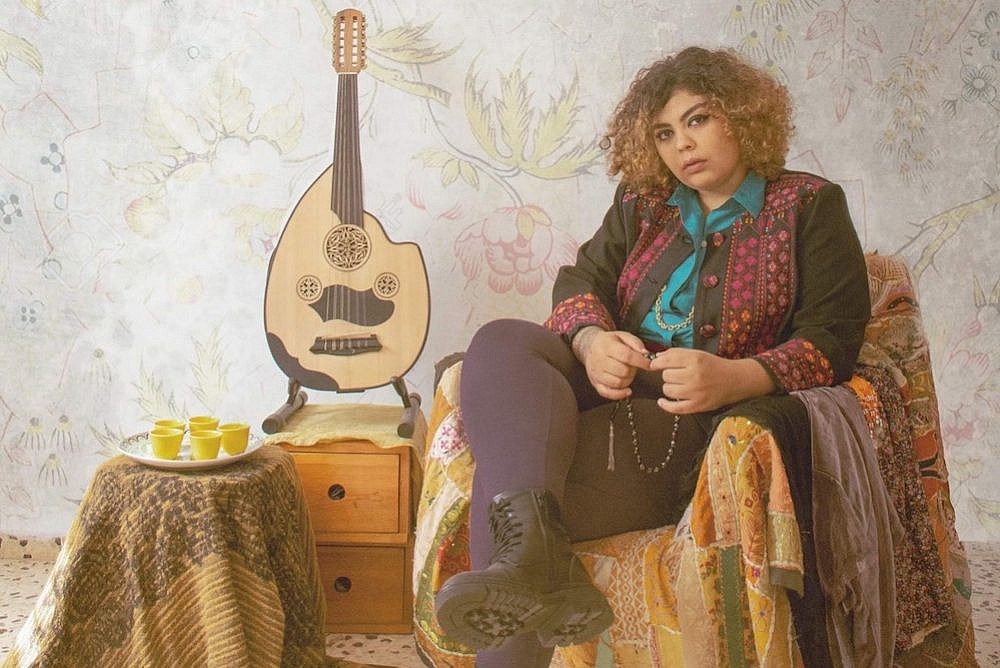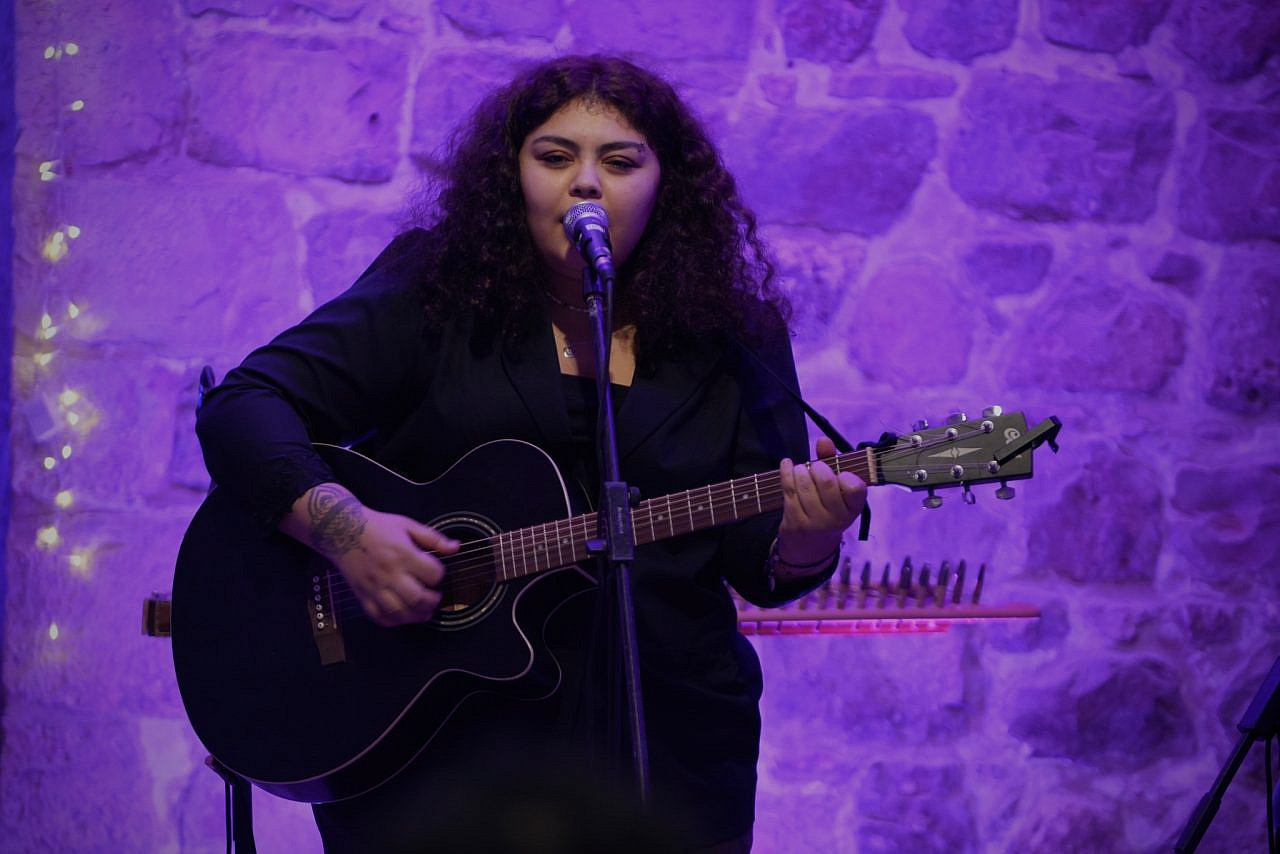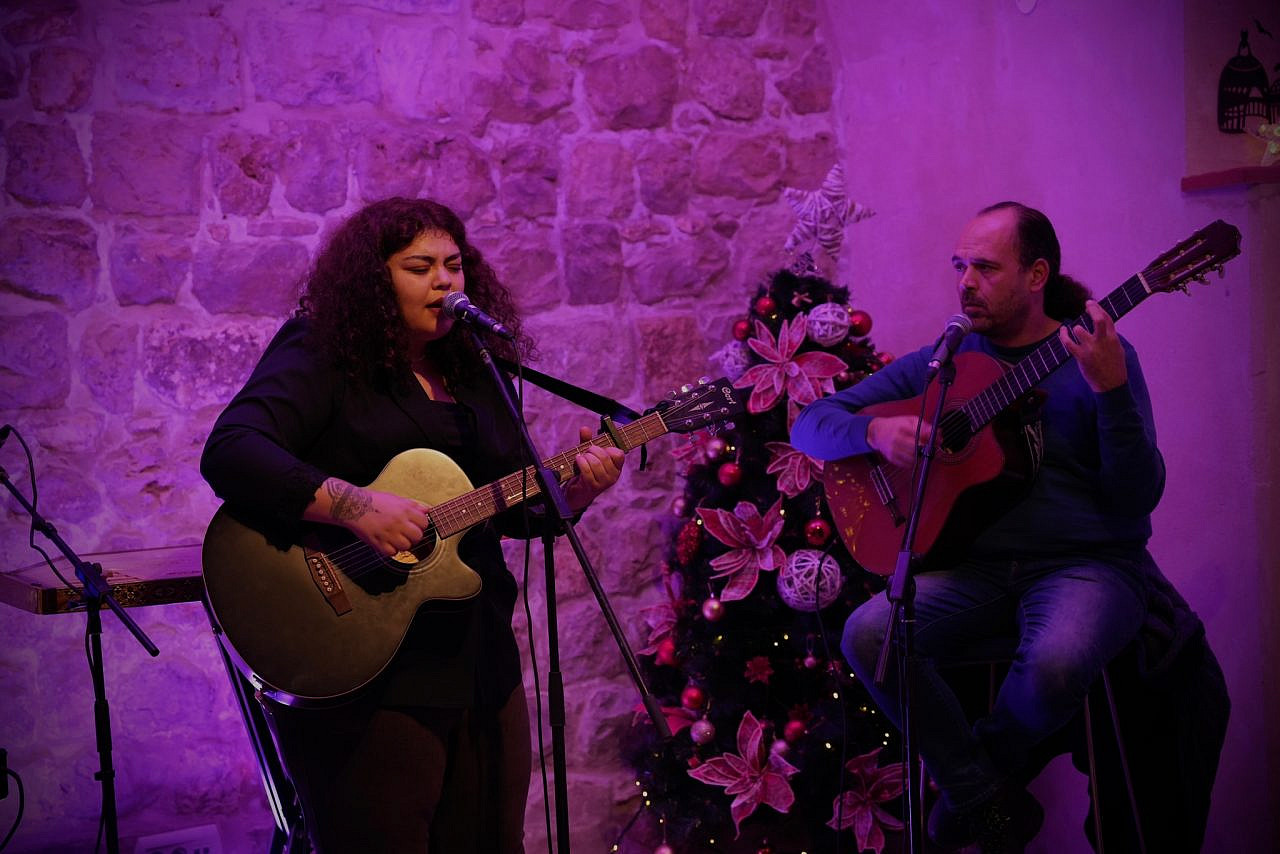Singer, songwriter, and producer Yusor Hamed is championing a new Palestinian sound that’s unashamedly her own. She fuses Middle Eastern cadence with European electronica, and traditional Arabic instruments alongside clipped verses and soaring choruses. Last year, her debut EP “Tuffah” cemented her name as one of Palestine’s most genre-bending and innovative musicians. Now, with a feature on German pop group Malaka Hostel’s recent single “Phoenix” and a European tour on the horizon, Hamed is about to win a whole lot more fans.
None of this came easy: Hamed has spent her life and career facing battles on several fronts. Limitations have been forced upon her by the Israeli army, the Palestinian Authority, and those who say women should stay at home and stay away from music. But rather than buckle under the pressure, Hamed resists, using her experiences as fuel to drive her career forward and forge a path that’s truly her own.
Hamed is used to thriving amid such struggles. Born in Tunisia to a mother from Gaza and a father from Tulkarem, Hamed moved to Gaza with her family when she was four. Her early memories are full of lazy mornings on the beach and happy afternoons at her grandmother’s home, which was on the 11th floor of a beautiful building overlooking the coastline.
This was also a period of musical awakening for Hamed, whose parents let her watch the music channel as much as she liked. It was the mid-’90s, so she was exposed to the sounds of Arabic pop as well as western R’n’B and hip hop. “My parents noticed that I was enjoying the music a lot, so they bought me cassettes from local artists like Rim Banna, Nawal El Zoghbi, Najwa Karam and Wael Kfoury,” Hamed says. When she wouldn’t stop singing, her parents registered her at the Edward Said National Conservatory in Ramallah. She won a place, and, at age 7, began learning the qanun — a string instrument with an ancient history in the Middle East and North Africa.
The Conservatory was good for Hamed. She was born with music in her bones, and it gave her the opportunity to explore that, as well as providing her with some stability while her family figured out where to settle.
“My mother was really attached to her family and she didn’t know anything about Ramallah or the West Bank because she didn’t grow up there,” Hamed recalls. “We used to spend two weeks in Gaza, and then two weeks in Ramallah.”
Hamed was treated like an outsider in both locations. The Gazan accent is different to Ramallah’s, and Hamed found herself trying to adopt both. “I always felt very different,” she says. “And when I used to go to my grandfather’s house in Tulkarem, they had a very closed culture. The fact that I played music was haram [forbidden] and they wanted me to wear a hijab and pray, and it wasn’t an option to become a musician.”
Hamed felt happiest in Gaza because she was surrounded by her mother’s huge family, but her parents worked with the Palestine Liberation Organization, fierce rivals of Hamas; when the Islamist group came into power in 2006, the family was forced to move to Ramallah permanently, and that’s where Hamed turned to music for solace.
Hamed performed at the Conservatory every few months, playing increasingly complex pieces on her qanun either solo or as part of an orchestra. But she didn’t feel satisfied learning just one instrument. She started playing the drums and borrowing her friend’s guitars, and whenever the piano room was free she’d sneak in and start tinkering on it. “I was never fulfilled,” she says. “I always wanted more.”
So after she graduated from the International Academy of Art Palestine in Ramallah in 2018 with a degree in visual arts, Hamed went to Amman, Jordan, with local initiative BalaFeesh to learn how to produce using music production software Ableton Live with Lebanese music producer Zeid Hamdan.
Resisting boundaries
Coming of age alongside the famed Palestinian hip hop group DAM influenced Hamed’s development as a musician. DAM’s music was youth politics in aural form, and their 2012 album “Dabke on the Moon” — released in response to Israel’s assault on Gaza that year — laid the blueprint for Palestinian rap.
From then on, Palestine’s hip hop scene became a space for young people to feel empowered and release their frustration, which Hamed absorbed throughout her young adulthood. So when she returned to Palestine from Jordan as a talented electronic musician, Ramallah’s hip hop scene came knocking. “Many hip hop artists reached out to do collaborations with me,” Hamed says. “I’d do choruses, verses, so I got experience working on other people’s beats. It taught me so much about songwriting.”
Hamed’s SoundCloud is packed full of tracks and collaborations with Palestine’s most prominent hip hop artists, while featuring styles from soul to folk to storytelling. Hamed refuses to stick to one genre, and hip hop is just another way for her to explore the depths of her artistry.
As her profile grew, Hamed was dealing with the myriad of challenges Palestinian artists face — especially women. “When I was a teenager I was exposed to the man’s world,” she explains, “like violence, power, and the [idea that] men go out and fight while women must stay at home away from the streets.” Hamed’s freedom was restricted — not just by walls, checkpoints, and weekly Israeli army raids, but by her own community. Music, though, was a space where she could be free to express and present herself on her own terms, and resist the boundaries imposed on her.
In recent years it has become increasingly difficult for musicians to perform in the occupied West Bank, as some of the local population see it as disrespectful to dance and sing while the community is in mourning. Israeli security forces and settlers have killed over 85 Palestinians so far this year, putting 2023 on track to become the deadliest year for Palestinians in the West Bank for decades. So Hamed experiences constant tension between wanting to share her music and respecting her community.
Then there’s the internal difficulties within the Palestinian hip hop scene itself. As Hamed became more involved, she found herself taking on other people’s battles. “It’s a dirty scene,” she says. “There’s so much ego and so many fights, everything’s a competition. I started losing myself.”
The COVID-19 pandemic presented an opportunity for Hamed to take a step back and focus on her own music. She spent lockdowns working on her production skills and perfecting her sound, and in March 2021 she released her biggest collaboration to date — “Asli Barri” — alongside DAM’s Maysa Daw and fellow solo artists Lina Makoul, Nancy Hawa, and Noel Kharman. The track aimed to raise awareness of violence against women in Arab communities, and for Hamed it also served as a reaction to the male energy that stunted her growth as a young woman.
In 2022, Hamed was finally ready to release her debut EP “Tuffah.” It’s a four-track record full of strength drawn from her experiences of intifadas and wars alongside the limitations forced on her as a result of her gender. The title track “Tuffah” is a slow, wistful production with lyrics that express longing for the day when the land between the Jordan River and the Mediterranean Sea is no longer fragmented. The track features DAM’s Daw, and is both hopeful and mournful — a juxtaposition Hamed makes a habit of creating in her music.
“Minl Jamal Lal Jalal,” featuring JayJay, is an homage to the traditional sound of Palestine with a modern, electronic twist, while “Ghanilek,” which features Rasha Nahas, is a song about love, loss, and heartbreak. And “Te3rafi Bel Ghaib,” featuring Ahmad Mizro, is for Hamed’s mom: “My mom is a very worried person,” she laughs. “She’s always nervous and stressed so I wrote her a song about how she worries, and the title means ‘you know the fortune,’ because she always likes to predict.”
The EP firmly cemented Hamed as one of Palestine’s most versatile and exciting artists. She loves to perform, and she’s about to launch a tour of the country, on both sides of the Green Line. But Hamed knows that her future as an artist here is limited. In recent years, many of her gigs have been canceled — sometimes because of tragedy, but sometimes for reasons she doesn’t understand. It is just another side effect of the world’s longest-standing occupation, and the cultural struggle to resist the erasure of Palestinian identity. So Hamed is making moves to spend some time in Europe and grow as an artist in a space that doesn’t impose restrictions.
“It scares me that I don’t have a plan for the future,” Hamed says. “My comfort zone is here, my people, my language, my family. It’s scary to go into the unknown, but part of being a musician is moving around. And I just keep reminding myself that I will always come back.”



